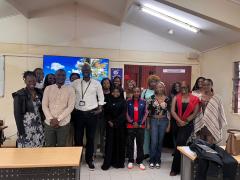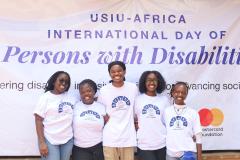Malawi Makes History: The Opposition Wins Presidential Election Rerun
Last night, Saturday, June 27, 2020 Malawi became the first country in Africa where a presidential election rerun was won by the opposition. On February 3, 2020 Malawi became the second country on the continent where the Constitutional Court nullified the presidential election of May 21, 2019 because of widespread, systematic, and grave irregularities and anomalies that compromised the right to vote and the democratic choice of citizens. The first country was Kenya where the presidential election of August 8, 2017 was annulled by the Supreme Court on September 1, 2017. However, in Kenya the ruling party proceeded to win the election rerun which was boycotted by the opposition.
Malawi’s unprecedented political feat sprang from eight powerful forces. First, it is a tribute to the protracted and unrelenting struggles of its people for democratic governance. For a year they persevered with mass demonstrations against the wanton theft of their votes despite threats and repression by the beleaguered and discredited government. They were sick and tired of the crass, corrupt, inept, and ethnocentric leadership of the Democratic Progressive Party (DPP) in power since 2004, save for a brief interlude. The two-year interval was the presidency of Joyce Banda following the death of Bingu wa Mutharika in April 2012 and the election of Peter Mutharika, the late Bingu’s brother, in May 2014.
This reflects, secondly, Malawi’s political culture of collective nationalist pride that goes back to decolonization. No region or ethnic group claims ownership of the independence struggle. The nationalist movement fought on two fronts, against British colonialism and against settler colonialism of the Central African Federation of Rhodesia and Nyasaland. Malawi was the poorest of the three colonies in the federation that included Zambia (Northern Rhodesia) and Zimbabwe (Southern Rhodesia). It was a labor reserve of Southern Africa, a political economy that gave rise simultaneously to a regionalist and nationalist outlook, a propensity to embrace regional developments and forge a distinctive national path.
In the struggles for democratization, for the “second independence” in the 1980s and early 1990s, Malawi’s political culture was buoyed by the emergence of strong social movements. These movements coalesced most prominently around the Public Affairs Committee and the Human Rights Defenders Coalition. Formed in 1992 as a pressure group of religious communities and other forces, PAC became a highly respected and influential political actor. While PAC functioned as a civil interlocutor for democracy, the HRDC flexed its political muscles in organizing mass protests.
Complementing political culture, thirdly, is political socialization. As in much of Africa, regional and ethnic political mobilization and polarization have deepened since independence as the capacities of the political class to deliver the developmental and democratic promises of uhuru declined and their appetites for primitive accumulation escalated. However, the nationalist memories and aspirations for nation-building lingered. The DPP’s openly ethnocentric and exclusionary regime became deeply resented. The country’s robust media, both the traditional and new social media, provided ample space to vent against the intensifying regional, ethnic, and religious divides.
Reinforcing the complex and contradictory dynamics and demands of the country’s political culture and political socialization was, fourth, the emergence of a fiercely independent judiciary that refused to be intimidated by the executive branch in the country’s tripartite system of government. Not only was the judgement of the Constitutional Court annulling the presidential election unanimous, it was upheld by the Supreme Court on May 8, 2020 against a misguided and embarrassing appeal by the DPP and Malawi Electoral Commission. In their deliberations the courts demonstrated admirable, methodical and brilliant jurisprudence. Most critical was the ruling that the winner in presidential elections should amass over 50% of the valid votes cast.
At a stroke, a fatal dagger was struck at the heart of regional and ethnic politics, of the DPP’s electoral shenanigans, for no party could any longer win by only mobilizing its base. The opposition parties, led by the independence party, the Malawi Congress Party, and the recently formed United Transformation Movement, quickly entered into a powerful alliance. The DPP also forged an alliance with the party that had won the first democratic election of 1994, the United Democratic Party, out of which the DPP split.
Desperate and ill guided efforts by the DPP government to fire the Chief Justice and his deputy a little over a week before the elections provoked national, regional and global outrage from chief justice and lawyers associations as well legal scholars and activists, a much valued expression of African and international solidarity. The legal community in the country went on unprecedented nation-wide demonstrations. It was an act of political sabotage that brought utter humiliation to the DPP leader, Peter Mutharika, a lawyer educated at the University of London and Yale University who taught for more than four decades in Tanzania, Ethiopia, and the US at Rutgers University and Washington University. It underscored the fact that high levels of education and diaspora exposure in the global North provide no immunity to the pathologies of political narcissism, incompetence, and idiocy.
The strength of the opposition movement against the DPP’s kleptocratic and dynastic rule was facilitated, fifth, by a generational shift in the country’s politics. Like most African countries, Malawi’s population is predominantly young. The median age for the country’s 20.1 million people in 2020 is 16.5 and 66.7% are below the age of 24. This means the vast majority of the country’s population have no memories of Dr. Banda, the founding president, and his dictatorial regime from 1964 to 1994. What they know is the ineptitude and putrescence of the governments of the Mutharika brothers.
Ravaged by poverty, unemployment, and underemployment the youth are hungry for more accountable and development-oriented government. They were the backbone of the widespread protests that rocked the country following the rigged election of May 2019. They were particularly galvanized by the charismatic Vice President, Dr. Saulos Chilima, who was born nine years after Malawi’s independence. They could not relate to the octogenarian and antediluvian DPP leader, President Mutharika, born in 1940.
The new government represents a generational shift in several ways. The new president, Dr. Lazarus Chakwera, was born in the twilight years of colonialism and came of age after independence. All his predecessors were products of colonialism from which they inherited some of their perverted political and psychological dispositions. He is also the first graduate of the country’s first university, the University of Malawi, to ascend to the presidency. The first president born in the 1890s, received his university education in the US and Britain; the second and fourth didn’t attend university; the third and fifth also went to overseas institutions as they grew up when Malawi had no university.
President Chakwera’s election may also represent the end of the diaspora allure and grip over the Malawi presidency started by Dr. Banda. President Banda returned to Malawi to join the nationalist movement after spending 43 years abroad. The Mutharika brothers returned to rule also after decades in the diaspora. Presidents Bakili Muluzi (1994-2004) and Joyce Banda (2012-2014) were home grown. So is President Chakwera although he did graduate studies in the US. The diaspora will of course continue to play a role in Malawian politics, economy and society, but I suspect no longer at the level of the presidency.
The role of the diaspora noted above underscores the sixth context of Malawian politics and transitions, namely, the impact of external developments. It is possible to argue that the Constitutional Court was inspired by the nullification of the presidential election in Kenya in 2017. Earlier in the 1990s during the struggle for democratization, Malawi’s opposition movement was invigorated by the ouster of President Kaunda in 1991 in neighboring Zambia through a democratic election, as well as the momentous demise of apartheid in South Africa, the subregional metrople of Southern Africa that from the late 19th century drew millions of workers from the labor reserves of the region including Malawi.
More recently, two developments have cast their shadows on the Malawian political and developmental imagination. First, is the meltdown of Zimbabwe under the incompetent and venal Mugabe dictatorship, a spiral that has continued under his successor, President Mnangagwa. Zimbabwe was once a major destination for Malawian migrant workers and a country that in the first decade of independence was seen as a model of democratic developmentalism notwithstanding the heavy structural legacies of settler colonial capitalism.
Second, was the relatively impressive economic growth of Malawi’s neighbors from Tanzania in the north, Zambia in the west, and formerly war-torn Mozambique enveloping the southern part of the country. Further afield was Botswana, one of Africa’s most impressive stories of postcolonial success. In my own personal family, we have roots and relatives in all these countries, in Zimbabwe where I and several of my siblings were born, Mozambique where my son currently works, Botswana where my late father lived for 30 years and my young sister has always lived, Zambia where my late mother spent part of her youth, and South Africa where we have relatives. Our family story is quite common among many Malawians. This partly explains the intolerance for petty ethnic identities.
Thus, given Malawi’s regional tentacles generated by the history of migrant labor, reinforced by the transport and communication networks of a landlocked country, and the thick circuits of contemporary media, many Malawians are acutely aware of regional developments. They are frustrated and angered by the fact that their country seems to be lagging behind their southern African neighbors in terms of development. They blame it, rightly, on poor leadership and bad governance, exacerbated by the culture of mediocrity and low national expectations.
The professionalism of the military is the seventh critical factor in Malawi’s remarkable electoral transition. Since independence and at crucial moments, they have consistently maintained loyalty to the Constitution of the Republic, not the President as Commander-in-Chief. They did so in 1992 during the referendum on multi-party democracy and in the subsequent two years. Similarly, in 2012 they facilitated the ascendancy of the estranged Vice President, Joyce Banda, when a DPP cabal led by the recently defeated president, Peter Mutharika, were planning an unconstitutional take over. Since the annulment of the election in 2019 till the rerun they provided security for peaceful protests. And the moment it became clear that Dr. Chakwera was the incoming president they beefed up state security for him.
The coronavirus pandemic provided the eighth context against DPP rule. As elsewhere, COVID-19 exposed the glaring incapacities of the state and the depth of socioeconomic inequalities in the country. When the government sought to impose a lockdown in April 2020 to contain the spread of the pandemic, the HRDC went to court and won an injunction against the lockdown. The HRDC argued that the government had not undertaken consultations and provided measures to cushion the poor and most vulnerable against the impact of the lockdown.
Protests by small-scale traders, most of them young people, demanded government support in terms of cash handouts and food to help them manage the harsh effects of a lockdown. Underlying these protests was general lack of faith in the government’s capacity to manage the crisis, which fed into the narrative of government corruption and incompetence. In short, even during, or despite, the most devastating health and economic crisis to hit the country and the world in decades, there was little trust in the state, which is likely to lead to the devastation the economy and society as the pandemic spreads.
Clearly, the opposition rode to election victory on the backs of sweeping dissatisfaction and disaffection with Malawi’s democratic dispensation since 1994. The June 23, 2020 election rerun itself reveals five remarkable developments, lessons, and possibilities some of which have implications for Africa as a whole. First, the new Malawi Electoral Commission (MEC) delivered on its mandate with impeccable integrity in record time. The Commission was sworn in on June 9, 2020 under the leadership of a relatively young, dynamic, and incorruptible chairperson, Justice Chifundo Kachale. He replaced the shamelessly partisan Dr. Jane Ansah.
Within three weeks the new MEC was able to deliver the country’s most credible presidential election since the first post-independence multi-party elections of 1994. It underscores the importance of appointing competent, credible, committed, and ethical professionals to national bodies and functions and the power of transparency. Unlike before, the election results were announced at each polling station and broadcast live to an anxious nation. People, including school children, could add the math. While the official announcement came on the night of June 27, within a day of the election the winner and the magnitude of his victory was known. Personally I started celebrating on the afternoon of June 24.
Second, the election was held without international observers, whether the European Union, Commonwealth, African Union, Southern African Development Community, United Nations, or other self-appointed guardians of democracy from individual nations such as the United States. These bodies had betrayed Malawians before. To quote Danwood Chirwa, a prominent Malawian legal scholar and Dean of the law school at the University of Cape Town, “Malawians were left to their own devices to claim and defend their right to vote. They did this through a protracted but step-by-step effort involving many actors, each playing an indispensable role.”
My old friend from secondary school and college and former colleague at the Pennsylvania State University, the eminent legal scholar and founding Dean of the School of International Affairs at Penn State, Tiyanjana Maluwa, put it this way, “We don't need foreign election observers to help us conduct a credible election. Indeed the foreign observers, with their formulaic verdicts ("the election was free and fair and generally reflected the will of the peoples...") were utterly rebuked by the very fact that the courts nullified the fraudulent presidential election that they had all praised for its fairness.”
Third, the election was conducted without foreign funding. Malawi relied on its own admittedly depleted budget spurning the ubiquitous “donor support” that the arrogant purveyors of the mercy industrial complex wave to so many supplicant African governments to conduct one of the most basic functions of sovereignty—elections. It is humiliating when African governments seek financial support and political validation for their elections from the cynical and self-serving election observer industry that has grown over the last three decades since the democratic wave at the turn of the late 1980s and early 1990s.
Fourth, the election result showed that despite the power of incumbency that was ruthlessly exploited by the DPP government, an organized, disciplined, and smart opposition can win. Talking to some of the leaders of the opposition alliance and their supporters, I was impressed by their steely determination and calm confidence that they would prevail. The opposition alliance leaders crisscrossed the country, never taking the voters for granted, or trying to buy them with cheap gimmicks, handouts, and empty promises.
Fifth, the election succeeded in breaking the vicious grip on Malawian politics since 1994 by two families, the Bakili Muluzi political dynasty in which the former president has shamelessly transacted his son, Atupele Muluzi, who succeeded him as leader of the UDF, to every possible political alliance, most recently as the running mate of DPP’s Peter Mutharika, to gain power and save the father from a long-running corruption case. The Mutharika brothers succeeded each other as party leaders, and after a brief interlude for Peter Mutharika as noted earlier, as presidents. Whatever one might say about the MCP, it has never nurtured a family dynasty.
As is common in moments such as this, the atmosphere in Malawi at the moment is filled with giddy excitement and great expectations. I could hear it when I listened to local radio last night when the results were being announced in Blantyre, the country’s commercial city, and this morning during the presidential inauguration ceremony in Lilongwe, the national capital. The excitement will inevitably dissipate and the high expectations will encounter disappointments. I remember the intoxicating euphoria of 1994 only too well. In May that year I returned from 17 years of self-imposed exile to partake in the exhilarating dance of democracy.
The new government represents, potentially, the dawn of what one can call Malawi’s Third Republic. The first was the era of Dr. Banda. The second era comprises the last 26 years of the Muluzi-Mutharika dynasties. These conjunctures in Malawian history coincide, with some discrepancies, with the three eras of development and democracy in post-colonial Africa. In my work, I call the first the era of authoritarian developmentalism (1960-1980), the second the era of neoliberal authoritarianism (1980–2000); and the third the dawn of the era of possible democratic developmentalism (since 2000).
As I have written more elaborately elsewhere, the era of authoritarian developmentalism was characterized by the intensification of statism (the growth of state power) and developmentalism (the pursuit of development at all costs). The escalation of statism after independence was accentuated by the underdeveloped nature of the indigenous capitalist class and the weak material base of the new rulers. The state became their primary instrument of primitive accumulation. Also important to remember is that the legitimacy of the postcolonial state lay in meeting the huge developmental backlog of colonialism to the expectant masses.
State intervention in the organization of economic, social, cultural, and political processes intensified as the contradictions deepened and became more open. As the crisis of growth and accumulation began escalating globally in the 1970s, the postcolonial state assumed a progressively more precarious and openly repressive character with frequent coups and rearrangements of ruling cliques, endless constitutional revisions and human rights violations, and suppression of democratic freedoms. To be sure, until the mid-1970s, African countries experienced relatively rapid rates of economic growth and development, notwithstanding significant differences between countries, sectors, and social classes, gender, and generation, as well as ideological divergences and disputes among and within countries.
The structural and ideological underpinnings of authoritarian developmentalism were reinforced by the onset of neoliberalism at the turn of the 1980s, which ushered Africa’s “lost decades” of the 1980s and 1990s. The era of structural adjustment programs (SAPs) threatened to undo the developmental promises and achievements of independence, to dismantle the postcolonial social contract, and to abort the nationalist project of Africa’s renewal from centuries of the slave trade followed by colonialism. The rise of SAPs reflected the global ascendancy of neoliberalism, which emerged as an ideological response to the world economic crisis of the late 1960s and early 1970s that ended the postwar boom.
Neoliberalism marked the collapse of the “Keynesian consensus” and the political coalitions that had sustained it and the rise to power of conservative, free-market-oriented governments in the leading industrial economies. SAPs were pursued with missionary zeal by the international financial institutions and western governments and imposed on developing countries often with the connivance of the African political class or significant fractions thereof. SAPs called for currency devaluation, interest and exchange rate deregulation, liberalization of trade, privatization of state enterprises, and withdrawal of public subsidies and retrenchment of the public service—in short, for a minimalist state and an extension of the market logic to all spheres of economic activity.
The results were disastrous for African economies. The euphoria of independence gave rise to unrelenting “Afropessimism.” The collapse of the independence social contract provoked massive and sustained struggles for the “second independence”, for democratization which gathered momentum in the 1990s and scored significant victories at the turn of the 2000s. This ushered in the possibilities of the third era of democratic developmentalism. The resumption of economic growth in the 2000s and 2010s, reprising the growth rates of the 1960s and first half of the 1970s, brought hope back as encapsulated in the narrative of Africa Rising/Rising Africa.
However, the match between economic growth and development remained elusive as socioeconomic inequalities deepened and industrialization proved elusive and the value chain of African economies remained low. Similarly, the marriage between democracy and development was hardly consummated in many of the emerging illiberal democracies. Africa’s wily ruling classes sang the performative and symbolic tunes of minimalist democracy as they subverted the substantive and expansive score of social democracy.
The historiography of Malawi’s postcolonial political economy broadly fits into this trajectory. The Banda presidency straddled the first two eras, while the last quarter century since multi-party democracy was introduced coincides with the last two eras. In other words, Malawi like most African countries has been struggling to establish a democratic developmental state that can produce economic growth and foster integrated, inclusive, innovative and sustainable development. In short, the challenge for the new Chakwera government is to build and sustain a democratic developmental state.
The great Malawian intellectual, Thandika Mkandawire, who passed away on March 27, 2020 at the age of 79, produced some of the most iconic work on the African developmental state that the policy makers and think tanks for the Chakwera government can fruitfully engage. Thandika, as we all lovingly called him, firmly believed in the existence of an ideological-structural nexus for building developmental states in Africa. He argued developmentalism has an ideological imperative in that it requires making development aspirations hegemonic, and structural components that encompass state capacities—institutional, technical, administrative, and political to implement effective and transformational development policies.
Clearly, it is imperative to strengthen the administrative apparatus of the state while at the same time building strong state-society synergies. Thandika’s work brilliantly debunks many of the conventional diagnoses and prescriptions for development. They tend to be based on ahistorical determinisms of geography, culture, and history. At one time race and ethnicity were posited as explanations, but they are no longer entertained in the academy. More compelling are explanations that focus on institutional arrangements, the construction of inclusive economic, political, and social institutions.
As I wrote in a recent essay, “Countries with extractive institutions have not fared as well in achieving sustained growth and development. To the quality of institutions, I would add two other critical factors: the quality of human capital and the quality of the social capital of trust.” At this conjuncture, authoritarian developmentalism belongs to the dustbin of history because Malawians and other Africans have and continue to wage protracted struggles for democracy.
A democratic developmental state is one that embodies the principles of electoral democracy, ensures citizens’ participation in the development and governance processes, and fosters growth and development. The democratic developmental state is defined by its objectives and its institutional characteristics, including the “autonomy” of state institutions, that enable it to define and promote its strategic developmental goals and its “embeddedness,” that is, its ability to form alliances with key social groups in society that help it to achieve its developmental goals.
In short, a democratic developmental state is characterized by institutional autonomy and coherence and inclusive embeddedness operating in a democratic order marked by competitive and accountable electoral systems and has the capacity to promote development and growth. The construction of democratic developmental states requires Africa to confront and control several sets of challenges and opportunities. At the domestic level there is need to revitalize the nationalist project by reconstructing the state, rebuilding citizenship, renewing the social contract, reconstructing society, and rejuvenating integrated and inclusive economies— in short, to manage the nexus of state, market, and civil society as effectively as possible.
This is the challenge and opportunity of the Chakwera-Chilima alliance that has been voted into government by Malawi’s expectant masses who are exhausted by underdevelopment, poverty, inequalities, tribalism and regionalism, marginalization, and social despair now compounded by COVID-19. Thandika, who remained resolutely committed to the five humanistic and historic agendas of progressive African nationalism—decolonization, nation-building, development, democracy, and regional integration—would have been proud of the Chakwera-Chilima electoral victory this week. In fact, the two parties and many others publicly mourned Thandika’s passing. Let the luminescence of his ideas and insights be incorporated into the new government’s policy agenda.
Thandika always believed in the agency of Malawians and Africans everywhere at home and in the Diaspora. His compatriots vindicated him in the June 2020 presidential election rerun, while the Diaspora did so through the Floyd protests. Malawi has a rare chance to construct a developmental democratic state and society. I hope that a new chapter has opened in my beloved country's history.
I dedicate this essay to Thandika and the thousands of women and men who sacrificed their lives and livelihoods during the struggles for the first, second, and third republics for the simple dignity of the human rights of democracy, development, and inclusion.
First written June 28, 2020.





